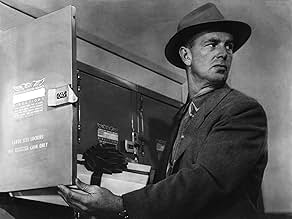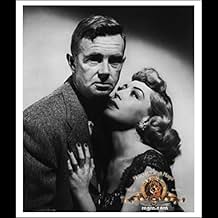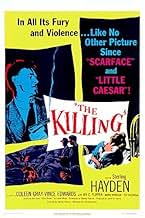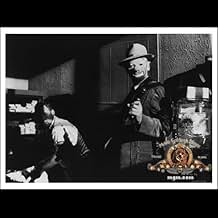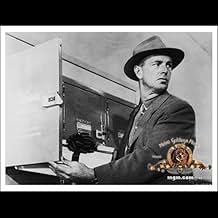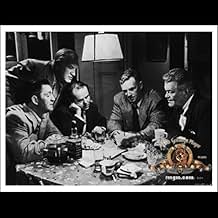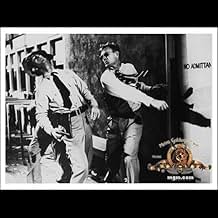IMDb RATING
7.9/10
102K
YOUR RATING
Crook Johnny Clay assembles a five-man team to plan and execute a daring racetrack robbery.Crook Johnny Clay assembles a five-man team to plan and execute a daring racetrack robbery.Crook Johnny Clay assembles a five-man team to plan and execute a daring racetrack robbery.
- Director
- Writers
- Stars
- Nominated for 1 BAFTA Award
- 1 nomination total
Ted de Corsia
- Patrolman Randy Kennan
- (as Ted DeCorsia)
Elisha Cook Jr.
- George Peatty
- (as Elisha Cook)
Joe Turkel
- Tiny
- (as Joseph Turkel)
- Director
- Writers
- All cast & crew
- Production, box office & more at IMDbPro
Featured reviews
There is a plan that just can't fail no matter what, take the racetrack's banked cash roll, take all it's got, everybody knows their place, where to be for the big race, then where to gather, to take their share, of the big pot.
A piece of cinema magic that to this day leaves you astounded at the brilliance of the writer/director, amazed at the sensational performances by some truly great actors, and as engaged as you could ever hope to be with a story that nestles nicely in the age and the era from which it was born, an accomplishment that so many films of that time fail to achieve when revisited.
A piece of cinema magic that to this day leaves you astounded at the brilliance of the writer/director, amazed at the sensational performances by some truly great actors, and as engaged as you could ever hope to be with a story that nestles nicely in the age and the era from which it was born, an accomplishment that so many films of that time fail to achieve when revisited.
There's little to fault in Stanley Kubrick's classic robbery tale. The acting is first-rate with Marie Windsor, as Mrs. Peaty, a sarcastic stand-out. The story just pops off the screen - and at less than 90 minutes, there's literally no filler. I love the winding time line ("earlier that day" etc.), which has been liberally utilized by Quentin Tarantino (Jackie Brown, Pulp Fiction, Reservoir Dogs). This film was made right before Kubrick's WWI marvel, Paths of Glory, and his genius is apparent in both. No wasted words or actions. Love that last line!
The story of a meticulously-planned race track hold-up is a stunner in every minute you watch it, and the film's progressive use of a partly documentary style has often been acclaimed as uniquely supporting the dramatic goings-on. It definitely put a modern touch to the somewhat out-of-fashion film noir in 1956, but still greatly relied on its basic rules.
A fine new note was the neat distinction between the gang's members' motives, ranging from repaying underworld debts (De Corsia) and hope of offering a better life for his ill wife (Sawyer) to the vain ambition of pleasing his vamp wife by doing something special (Cook).
Despite the film's qualities, Kubrick's treatment of the women's rôles seems more than old-fashioned today. Women here are either the homely and sweet type (Coleen Gray) or the Bette-Davis-eyed and cherchez-la-femme type (Marie Windsor). Both are accordingly taller or smaller than their respective partners by a head.
I should like to mention one of my favourite pans: that's when the bald philosopher-catcher walks up to Joe Sawyer's bar. Lucien Ballard's camera follows him all across the crowded tote hall, a take which must have been very difficult to organize and shoot. Later, the scene is repeated with Sterling Hayden.
This motion picture is also a monument for the great histrionic art of Elisha Cook, Jr., in a stand-out performance as the born loser. (German dubbing gives him the apt voice of Stan Laurel's speaker Walter Bluhm.) This little man never just did his job in unnumerable supporting rôles but has rendered effective homage to the tragic figure on the silver screen more than any other (non-comical) character actor I can think of. Regardless of his versatility in lots of different films, his impersonations of a likeable man who is doomed to fail make him unforgettable: take his lethal parts in "Phantom Lady" (1944), "Shane" (1953) or the likes, the audience's sympathy was always with this fine actor.
A fine new note was the neat distinction between the gang's members' motives, ranging from repaying underworld debts (De Corsia) and hope of offering a better life for his ill wife (Sawyer) to the vain ambition of pleasing his vamp wife by doing something special (Cook).
Despite the film's qualities, Kubrick's treatment of the women's rôles seems more than old-fashioned today. Women here are either the homely and sweet type (Coleen Gray) or the Bette-Davis-eyed and cherchez-la-femme type (Marie Windsor). Both are accordingly taller or smaller than their respective partners by a head.
I should like to mention one of my favourite pans: that's when the bald philosopher-catcher walks up to Joe Sawyer's bar. Lucien Ballard's camera follows him all across the crowded tote hall, a take which must have been very difficult to organize and shoot. Later, the scene is repeated with Sterling Hayden.
This motion picture is also a monument for the great histrionic art of Elisha Cook, Jr., in a stand-out performance as the born loser. (German dubbing gives him the apt voice of Stan Laurel's speaker Walter Bluhm.) This little man never just did his job in unnumerable supporting rôles but has rendered effective homage to the tragic figure on the silver screen more than any other (non-comical) character actor I can think of. Regardless of his versatility in lots of different films, his impersonations of a likeable man who is doomed to fail make him unforgettable: take his lethal parts in "Phantom Lady" (1944), "Shane" (1953) or the likes, the audience's sympathy was always with this fine actor.
Stanley Kubrick's coming-out party from the mid '50s is a startlingly accurate prediction of film's future. By way of a non-linear narration and a few remarkably fresh transitions, Kubrick adds considerable weight and magnitude to a tangled heist tale and its focus on the crooks behind a slick, daring stickup of the local racetrack. Confused by the film's radical new approach to storytelling, test audiences hated the first cut, leading to studio meddling and an almost-complete disintegration of its marketing budget. Kubrick fought back, though, and with the obvious exception of a horribly heavy-handed deadpan narration, the finished product seems virtually untouched. Concerned mostly with the planning and hand-wringing before the big theft, The Killing tensely builds anticipation throughout before finally boiling over in a machine gun-paced robbery scene, terse payoff and all-too-brief elaboration on the major players' ultimate fates. Acceptably acted at best, the real stars of this picture are the complex plot and the harvest of fresh ideas going on behind the lens. A clear inspiration for Tarantino's big hits of the '90s, it's a daring and stylish major market debut for the famed director that hints at the lengths his development would ultimately take the medium.
The non-linear storytelling, overused nowadays even when it does not make any sense, is key to this taught thriller, narrated almost as a documentary.
Besides, despite the non-linear structure, the plot is very easy to follow, thanks to the narrator who tells the audience everything from the time of the day to the details about the gang involved in the audacious heist at the races.
It does't hurt that main character Johnny Clay is played by one of my favourite actors, Sterling Hayden, in a role that reminds me of his doomed character in The Asphalt Jungle. Clay is a coincise, world-wary character who planned the heist to the last detail, unfortunately missing the "human factor".
As it's customary in stories about failed heists, there's always one detail that is either unknown or unpredictable, but important enough to wreak havoc even in the most perfect plan.
Perhaps my favourite Kubrick's movie, with a tight script, excellent cast and no-nonsense approach.
Besides, despite the non-linear structure, the plot is very easy to follow, thanks to the narrator who tells the audience everything from the time of the day to the details about the gang involved in the audacious heist at the races.
It does't hurt that main character Johnny Clay is played by one of my favourite actors, Sterling Hayden, in a role that reminds me of his doomed character in The Asphalt Jungle. Clay is a coincise, world-wary character who planned the heist to the last detail, unfortunately missing the "human factor".
As it's customary in stories about failed heists, there's always one detail that is either unknown or unpredictable, but important enough to wreak havoc even in the most perfect plan.
Perhaps my favourite Kubrick's movie, with a tight script, excellent cast and no-nonsense approach.
Did you know
- TriviaInitial test screenings were poor, citing the non-linear structure as the main problem. Stanley Kubrick was forced to go back and edit the film in a linear fashion, making the film even more confusing. In the end, it was released in its original form, and is often cited as being a huge influence on other non-linear films like Reservoir Dogs (1992) and Pulp Fiction (1994).
- GoofsDuring the robbery, it's clear that a significant amount of the money is in neatly banded bundles of crisp brand-new bills, yet when it's transferred from the duffel bag to the suitcase, all the bills are loose, unstacked, and appear well-used.
- Quotes
Johnny Clay: You'd be killing a horse - that's not first degree murder, in fact it's not murder at all, in fact I don't know what it is.
- ConnectionsEdited into Hai-Kubrick (1999)
Details
Box office
- Budget
- $320,000 (estimated)
- Gross worldwide
- $380
- Runtime1 hour 24 minutes
- Color
Contribute to this page
Suggest an edit or add missing content



